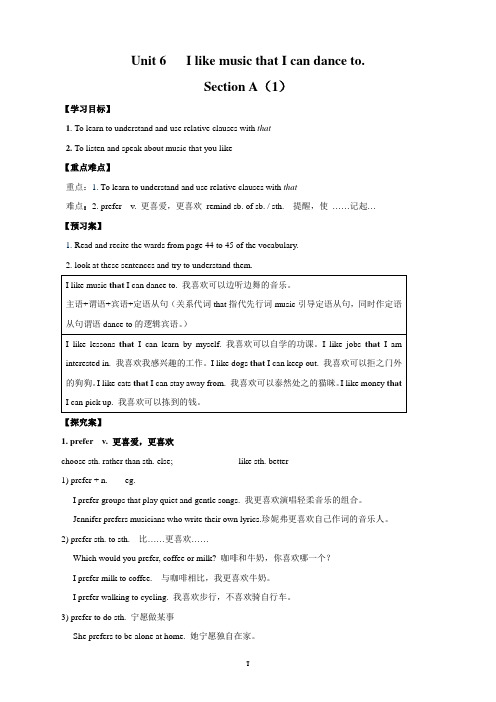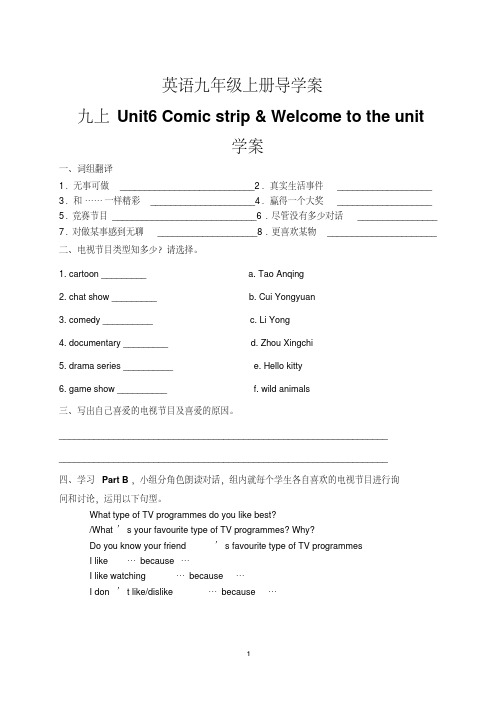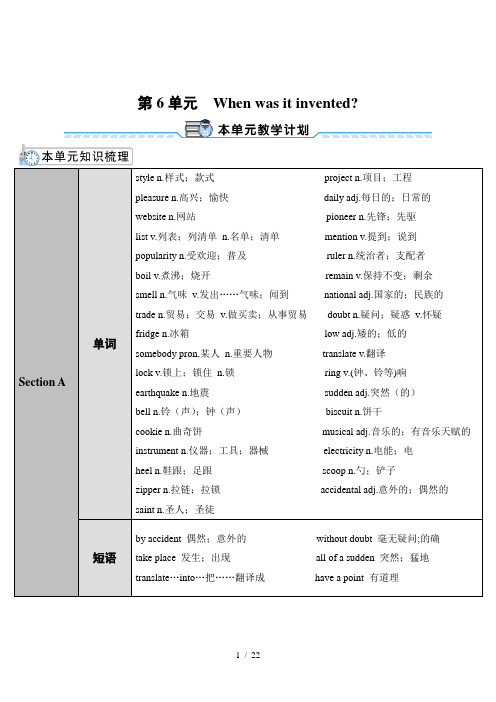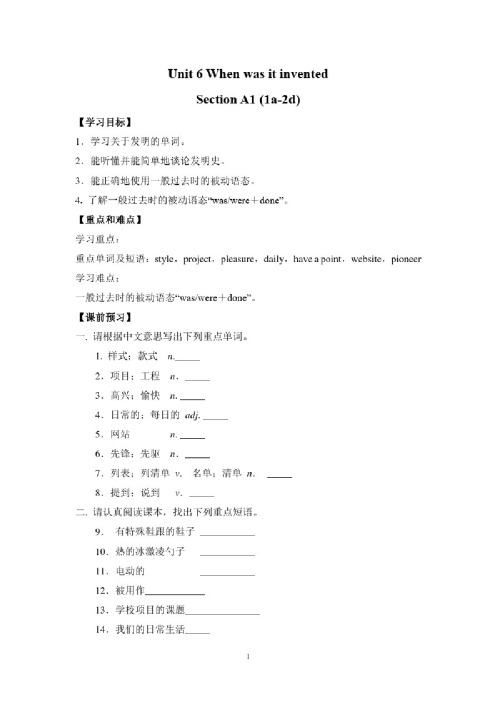2018-2019年人教版九年级英语上册Unit6句型语法导学案
2019-2020人教版九年级英语上册Unit 6 导学案

Unit 6 I like music that I can dance to.Section A(1)【学习目标】1. To learn to understand and use relative clauses with that2. To listen and speak about music that you like【重点难点】重点:1. To learn to understand and use relative clauses with that难点:2. prefer v. 更喜爱,更喜欢remind sb. of sb. / sth. 提醒,使……记起…【预习案】1. Read and recite the wards from page 44 to 45 of the vocabulary.2. look at these sentences and try to understand them.I like music that I can dance to. 我喜欢可以边听边舞的音乐。
主语+谓语+宾语+定语从句(关系代词that指代先行词music引导定语从句,同时作定语从句谓语dance to的逻辑宾语。
)I like lessons that I can learn by myself. 我喜欢可以自学的功课。
I like jobs that I am interested in. 我喜欢我感兴趣的工作。
I like dogs that I can keep out. 我喜欢可以拒之门外的狗狗。
I like cats that I can stay away from. 我喜欢可以泰然处之的猫眯。
I like money that I can pick up. 我喜欢可以拣到的钱。
【探究案】1. prefer v. 更喜爱,更喜欢choose sth. rather than sth. else; like sth. better1) prefer + n. eg.I prefer groups that play quiet and gentle songs. 我更喜欢演唱轻柔音乐的组合。
2018届中考英语复习九上Unit6导学案

九上Unit6 基础训练部分一、记忆训练部分(一)重点词汇梳理1.ha ve nothing to do 无事可做11.take a close look at 近距离的观看2.up-to-date information 最新的信息12.the weather report 天气预报3.enjoy solving mysteries 喜爱揭秘13.have little interest in 对......没兴趣4.send out 发送14.a waste of time 浪费时间5.have a chance to do sth 有机会做某事15.catch the readers’ attention 抓住某人的注意力6.vote online for 网上投票16.a number of 大量的7.announce the results宣布结果17.a weekly round-up一周的新闻概要8.realize your dream 实现你的梦想18.two free concert tickets两张免费的音乐会票9.10.a report on the coming World Cup一篇关于即将到来的世界杯的报道tell the public 告诉公众19. music videos音乐视频20.get scared easily很容易受到惊吓(二)重点句子梳理1.If you are as busy as me , you will not get bored with staying at home.如果你和我一样忙,你待在家里就不会感到乏味。
2.There are always famous people on these shows talking about their lives.总是有著名的人在节目中谈论他们的生活。
3.This year’s Beijing Music Awards will be covered live this Saturday.今年的北京音乐会将会被现场直播。
2018秋季学期人教版(RJ)初中九年级英语上册优质导学案:Unit 6 导学案-精品可打印

Unit 6 I like music that I can dance to.Section A(1)【学习目标】1.To learn to understand and use relative clauses with that2. To listen and speak about music that you like【重点难点】重点:1.To learn to understand and use relative clauses with that难点:2. prefer v. 更喜爱,更喜欢remind sb. of sb. / sth. 提醒,使……记起…【预习案】1. Read and recite the wards from page 44 to 45 of the vocabulary.2. look at these sentences and try to understand them.I like music that I can dance to. 我喜欢可以边听边舞的音乐。
主语+谓语+宾语+定语从句(关系代词that指代先行词music引导定语从句,同时作定语从句谓语dance to的逻辑宾语。
)I like lessons that I can learn by myself. 我喜欢可以自学的功课。
I like jobs that I am interested in. 我喜欢我感兴趣的工作。
I like dogs that I can keep out. 我喜欢可以拒之门外的狗狗。
I like cats that I can stay away from. 我喜欢可以泰然处之的猫眯。
I like money that I can pick up. 我喜欢可以拣到的钱。
【探究案】1. prefer v. 更喜爱,更喜欢choose sth. rather than sth. else; like sth. better1) prefer + n. eg.I prefer groups that play quiet and gentle songs. 我更喜欢演唱轻柔音乐的组合。
推荐文档9上Unit6导学案(含答案)

英语九年级上册导学案九上Unit6 Comic strip & Welcome to the unit学案一、词组翻译1.无事可做___________________________2.真实生活事件___________________ 3.和……一样精彩_____________________4.赢得一个大奖___________________ 5.竞赛节目_____________________________6.尽管没有多少对话________________ 7.对做某事感到无聊____________________8.更喜欢某物______________________ 二、电视节目类型知多少?请选择。
1. cartoon _________ a. Tao Anqing2. chat show _________ b. Cui Yongyuan3. comedy __________ c. Li Yong4. documentary _________ d. Zhou Xingchi5. drama series __________ e. Hello kitty6. game show __________ f. wild animals三、写出自己喜爱的电视节目及喜爱的原因。
____________________________________________________________________________________________________________________________________四、学习Part B,小组分角色朗读对话,组内就每个学生各自喜欢的电视节目进行询问和讨论,运用以下句型。
What type of TV programmes do you like best?/What’s your favourite type of TV programmes? Why?Do you know your friend’s favourite type of TV programmesI like … because…I like watching … because …I don’t like/dislike … because …英语九年级上册导学案九上Unit6 Comic strip & Welcome to the unit学案一、词组翻译1.无事可做___________________________2.真实生活事件___________________ 3.和……一样精彩_____________________4.赢得一个大奖___________________ 5.竞赛节目_____________________________6.尽管没有多少对话________________ 7.对做某事感到无聊____________________8.更喜欢某物______________________ 二、电视节目类型知多少?请选择。
人教版英语九年级上册导学案:Unit 6 第六课时导学案

第六课时3a~Self Check知识目标课堂环节§自主学习方案【新词自查】根据句意及首字母提示完成句子。
1.These people were divided into two groups according to their ages.2.Look,a few pear remain on the trees.Let’s pick them.3.It’s said that the potato chips were invented by m istake.4.The hot weather made the milk sour.5.My grandparents often goes shopping with a basket (篮子).§课堂导学方案Step 1完成教材3a-3b的任务【操作案例】1.根据3a所给表格列举出的内容提示,想出些你不喜欢做的事,然后想出一些发明来帮助你,然后和同伴进行交流,写出提要。
(3分钟)2.假设你现在是一名商人,根据3a 写的提要以及3b方框中所给的句型、短语提示写出一篇描述你的新发明的文章,介绍这种新产品并设法卖给你的同学们。
学生完成后评出优秀的作文在班上展示。
(5分钟)环节说明:本节主要是将读、写的任务结合起来不仅锻炼了学生的写作及对语言的综合运用能力,还巩固了学生对目标语言的学习及综合运用。
Step 2完成教材Self Check的任务【操作案例】1.用方框中所给单词的正确形式完成1部分的短文,然后让1位学生朗读短文同时核对答案。
(5分钟)2.用被动语态改写句子。
让5位学生在黑板上做,同时核对答案。
(5分钟)3.查找更多有关你最想了解的一项发明的信息,然后用所给提示写句子。
(4分钟)环节说明:本节主要是针对本单元的主要目标语言进行加强巩固训练,巩固了学生对目标语言的学习、识记和运用。
§当堂评价方案(详见当堂训练部分)。
人教版九年级英语上册第六单元导学案

第6单元When was it invented?Section A 单词style n.样式;款式project n.项目;工程pleasure n.高兴;愉快daily adj.每日的;日常的website n.网站pioneer n.先锋;先驱list v.列表;列清单n.名单;清单mention v.提到;说到popularity n.受欢迎;普及ruler n.统治者;支配者boil v.煮沸;烧开remain v.保持不变;剩余smell n.气味v.发出……气味;闻到national adj.国家的;民族的trade n.贸易;交易v.做买卖;从事贸易doubt n.疑问;疑惑v.怀疑fridge n.冰箱low adj.矮的;低的somebody pron.某人n.重要人物translate v.翻译lock v.锁上;锁住n.锁ring v.(钟、铃等)响earthquake n.地震sudden adj.突然(的)bell n.铃(声);钟(声)biscuit n.饼干cookie n.曲奇饼musical adj.音乐的;有音乐天赋的instrument n.仪器;工具;器械electricity n.电能;电heel n.鞋跟;足跟scoop n.勺;铲子zipper n.拉链;拉锁accidental adj.意外的;偶然的saint n.圣人;圣徒短语by accident 偶然;意外的without doubt 毫无疑问;的确take place 发生;出现all of a sudden 突然;猛地translate…into…把……翻译成have a point 有道理句型1.When was the telephone invented? 电话是什么时候被发明的?2.It is said that a Chinese ruler called Shen Nong was the first to discover tea as a drink. 据说有一位叫作神农的中国统治者最早发现了茶可以饮用。
人教版英语九年级全册Unit6__SectionA(2a-2d)精品导学案

Unit6 SectionA〔2a-2d〕精品导学案【学习目标】1、掌握本课单词、短语、句型Who was it invented by? What are they used for?2、能听懂含有一般过去时态被动语态的简短对话。
〔重点〕3、能运用一般过去时态被动语态谈论历史上的创造。
〔难点〕【学习流程一】预习交流〔10分钟〕2d局部,并把它翻译一、独学:1. 熟读识记以上目标句子。
2. 熟读课本P42、成汉语。
3. 预习导航: 根据汉语提示完成单词。
(1) I like the color of this coat but I don’t like its (款式).(2) It’s my great (快乐) to have a talk with you.(3) The little inventions have helped me a lot in my (日常的)life.(4) Julia introduced a good (网站)to me to learn English.(5) My mother always 〔列清单〕all things that she wants to buy before shopping.二、群学:交流疑难,提交问题【学习流程二】展示点评(25分钟)一、预习展示:1. 检查对新单词的掌握情况。
2. 分组展示预习导航。
二、新课展示:1. 听录音,完成2a。
2. 再听一遍录音,用2a的信息,完成2b。
三、口语展示:1. 用2a、2b 中的信息编对话,然后各组派学生到前板展示。
2. 朗读2d对话,并与同伴结对分角色表演对话。
【学习流程三】小结提升〔10分钟〕1. 各自对本课时所学知识进展小结。
2. 提升练习:汉译英(1) 在中国英语作为外语来使用。
__________________________________(2) 教师用粉笔。
__________________________________(3) 毛衣是用来保暖的。
人教版九年级英语上册Unit6导学案

Unit6When was it inventedSection Al(la-2d)【学习目标】1.学习关于发明的单词。
2.能听憧并能简单地谈论发明史。
3. 能正确地使用一般过去时的被动语态。
4.了解一般过去时的被动语态Fas/were+done”。
【重点和难点】学习重点:重点单词及短语:style.project*pleasure,daily,have a point.website,pioneer 学习难点:―般过去时的被动语态Fas/were+done'' □【课前预习】请根据中文意思写出下列重点单词。
1.样式;款式n.2.项目:工程n.______3.高兴;愉快______4.日常的:每日的adi.______5.网站n.______6.先锋:先驱11.______7.列表;列清单V.名单;清单〃8.提到;说到/______二.请认真阅读课本,找出下列重点短语。
9.有特殊鞋跟的鞋子10.热的冰激凌勺子H.电动的_____________12.被用作______________13.学校项日的课题14.我们的日常生活15.有道理三.请用以上重点短语完成下列句子。
16.它们是用来做什么的?What are they?17.我认为电视机是在汽车之后被发明的。
I think the TV the car.【合作探究】探究一、浏览la.lb中的图片,参考发明时间和发明家试着完成表格。
Time:1876,1885,1927,1971、Inventors:Carl Bens.Alexander Bell.J.L.Baird.John\bn Neumann Inventions Questions Answerszipper VMien was the zipperinvented?It was invented in1893.XMio was it invented by?It was invented by WhitcombJudson.TV setcarstelephonecomputers探究二、仔细阅读下列短语,在书中标记。
- 1、下载文档前请自行甄别文档内容的完整性,平台不提供额外的编辑、内容补充、找答案等附加服务。
- 2、"仅部分预览"的文档,不可在线预览部分如存在完整性等问题,可反馈申请退款(可完整预览的文档不适用该条件!)。
- 3、如文档侵犯您的权益,请联系客服反馈,我们会尽快为您处理(人工客服工作时间:9:00-18:30)。
句型语法
1. When was it invented? invent (v). 发明,创造.
它是什么时候被发明的?
这句话使用的是被动语态:(见课本P143)
(1). 被动语态表示句子的主语是谓语动词所表示的动作承受者。
(2). 被动语态基本结构:be+及物动词的过去分词
(3). 被动语态中的be 是助动词,有人称、数和时态的变化。
一般现在时被动语态为:am/is/are+过去分词
一般过去时被动语态为:was/were+ 过去分词
与情态动词连用的被动语态:情态动词+ be + 过去分词
(4). 被动语态中动作的发出者或执行者做介词by的宾语,放在句末,by 表示“由,被”的意思
主动语态:主语+ 谓语动词 + 宾语 + 其他成分
被动语态:主语+ be +过去分词 + by +宾语 +其他成分
如: Many people speak English. (主动语态)
English is spoken by many people. (被动语态) Eg:He has invented a new way of making silk. 他发明了一种制造丝绸的新方法。
2. Do you know who invented computers? 你知道谁发明的电脑吗?我们学过的以or结尾的表示职业的单词有:______________________________
inventor (n). 发明家,创造者,发明者. invention (n). 发明(物),创造例如:
Edison was a great ______(invent) who _____(invent) 1,093 (invent).
3.They’re used for seeing in the dark.它们被用于在黑夜里观
看。
be used for表示“被用来做……”,介词for表示目的和用途,
后面接名词或动词-ing形式。
Eg:纸是用来写字的。
手电筒)is used for . 手
电筒是用来在黑暗中照明的。
4. George wanted to make the customer happy. 乔治想让那位顾
客高兴。
make v. 使……怎么样,其后往往带复合宾语,常用句型如下:(1)主语+make+sb/sth+形容词。
例如:The news made her happy.
这消息使她很高兴。
(2) make+ sb/sth +do sth,让某人或某物做某事。
被动结构为:be made to do sth,某人或某物被迫做某事。
例如:
The boss makes the workers work eighteen hours every day.老
板让工人们每天工作
18小时。
The workers are made to work eighteen hours every day.工人们被迫每天工作18小时。
